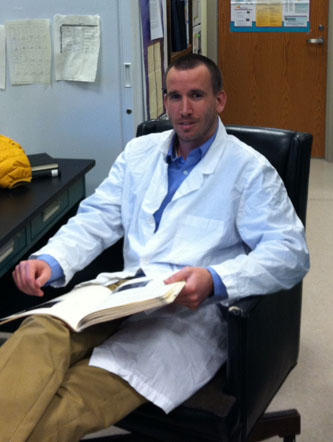Karatan Lab
Brad Goforth
Appalachian State University
Department of Biology
Rankin Science North
319 (Office), 303 (Lab)
828-262-6742

Role of VC0702 in Vibrio cholerae biofilm formation
Vibrio cholerae, the causative agent of the disease Cholera, can be found in aquatic environments in either a free swimming planktonic form or aggregated together into biofilms. It is speculated that cells enter into a biofilm state as a protective measure in response to environmental stressors which cells would otherwise not be able to survive. Environmental signals can either positively or negatively regulate biofilm formation based on concentrations of the signal in the environment and the pathway by which the signal acts upon. Many pathways act by regulating the cellular second messenger c-di-GMP through the action of two specific protein enzymes; EAL domain proteins that harbor phosphodiesterase activity and breakdown c-di-GMP, and GGDEF domain proteins that harbor diguanylate cyclase activity and synthesize c-di-GMP. An increase in c-di-GMP levels in the cell leads to an increase in biofilm formation. One specific pathway the Karatan lab studies is a polyamine dependent pathway that is thought to regulate biofilm formation by altering c-di-GMP levels in the cell.
The polyamine dependent pathway is thought to involve three proteins; NspS, a periplasmic protein which is predicted to bind norspermidine, MbaA, which contains an EAL domain which is likely to harbor phosphodiesterase activity,and VC0702 which has yet to be characterized. Both nspS and mbaA have been studied, but VC0702’s role in the pathway has yet to be determined. My research involves elucidating the role that VC0702 plays in the norspermidine dependent pathway by using molecular techniques to determine whether there are any protein-protein or protein-ligand interactions.